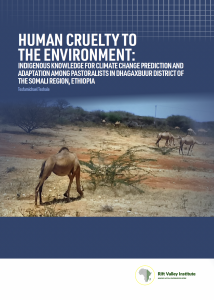INDIGENOUS KNOWLEDGE FOR CLIMATE CHANGE PREDICTION AND ADAPTATION AMONG PASTORALISTS IN DHAGAXBUUR DISTRICT OF THE SOMALI REGION, ETHIOPIA
EXECUTIVE SUMMARY
This paper explores how indigenous climate change prediction mechanisms help climate change adaptation among Somali pastoralists in Dhagaxbuur district of the Somali Region, Ethiopia. The paper analyses perceptions, indigenous knowledge of prediction and adaptation strategies of Somali pastoral communities in the context of climate change. A qualitative approach and a phenomenological research design were employed to collect data from both primary and secondary sources. The results reveal that pastoral communities recognize the trends of climate variability and its impacts on their livelihoods. Somali pastoralists traditionally predict the weather and climate variation through the observation of various biophysical entities, including livestock, insects, birds, plants and stars. Due to the impact of climate change and climate variability, pastoral communities have been practising various types of indigenous coping and adaptation strategies. This paper argues that there is a need to formulate and implement policies and strategies that incorporate indigenous knowledge related to climate change prediction and adaptation. Understanding pastoralists’ perspectives of climate change and their indigenous knowledge of its effects might provide critical input for climate change adaptation policies and pastoral development interventions.
Acknowledgements
This paper has been published as a result of Musa’s training in the Rift Valley Institute’s (RVI) Research Communities of Practice (RCoP) project. The paper therefore reflects the views of the author and not those or the position of the Rift Valley Institute. The RCoP is one of the RVI’s flagship projects that supports the professional development of early career scholars in east and central Africa through training, mentorship and dissemination of research outputs. Building on RVI’s long-term experience and presence in the region, the RCoP is a value-driven project that is built around a community of practitioners and academics with a common interest in the professional development of early career researchers. With funding from the Carnegie Corporation in New York, USA, and in partnership with the Open Society University Network-Hub for Connected Learning Initiatives, the RVI trained 27 early career scholars from Somalia, Somaliland, Ethiopia, the Democratic Republic of Congo (DRC), South Sudan and Kakuma refugee camp in Kenya in the first and second phases of the RCoP project between August 2022 and January 2024.
This report was edited by Catherine Rosemary Bond.
The Author
Tesfamichael Teshale is a Lecturer at Jigjiga University, Ethiopia. Tesfamichael holds a BA in History and Heritage Management and an MA in African Studies (Intellectual History and Cultural Studies) from Addis Ababa University. His research interests are in indigenous knowledge systems among pastoralists in Southeastern Ethiopia, and heritage tourism in Ethiopia and the Horn of Africa



